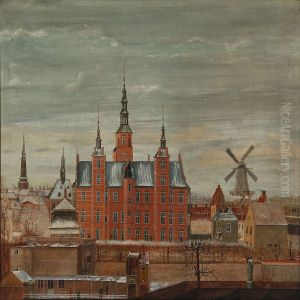Carl Ferdinand Eichmuller Paintings
Carl Ferdinand Eichmüller was a German artist born on September 5, 1845, in Munich. He is known primarily for his work as a genre painter, a style of painting that depicts scenes from everyday life, often with an emphasis on the domestic and social aspects of human interactions. Eichmüller's paintings typically showcase the rural and bourgeois life of his time, capturing the customs and spirit of the 19th-century Bavarian society.
Eichmüller studied at the Academy of Fine Arts Munich, which was a leading art institution in Germany. Here, he would have been exposed to the teachings of influential artists and professors, which helped shape his approach to art. During his career, he was part of the Munich School, a group of artists who were known for their realistic and detailed genre paintings, portraits, and landscapes. These artists were influenced by the academic art standards of the time but also incorporated aspects of the emerging Realist movement.
While there is not a wealth of information available about Eichmüller's personal life or his complete body of work, it is known that his paintings enjoyed a certain level of popularity in his day. They were appreciated for their attention to detail, use of color, and the ability to convey the character and mood of the subjects he portrayed.
Eichmüller passed away on July 9, 1915, in his hometown of Munich. His works continue to be of interest to collectors and historians who study the genre painting of the 19th century, and they offer valuable insights into the society and culture of that period in Bavaria. Although not as widely recognized as some of his contemporaries, Eichmüller's contributions to German art during the second half of the 19th century are nonetheless appreciated by those familiar with the Munich School and its impact on European art history.
